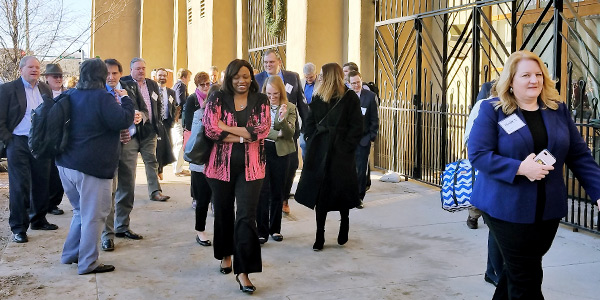By Tom Kleckner
SANTA FE, N.M. — FERC on Friday rejected SPP’s request to eliminate Z2 revenue credits for sponsored transmission upgrades, allowing the RTO to submit a revised proposal for the commission’s consideration without a cap limiting the terms and potential value of the credits’ replacement (ER20-453).
SPP had proposed using incremental long-term congestion rights (ILTCRs) instead, but the commission found modifications to the existing ILTCR compensation term to be unjust and unreasonable. The grid operator had suggested changing the compensation from a range of 10 to 20 years, to 20 years or until the upgrade sponsor recovers the directly assigned upgrade costs with interest, whichever occurs earlier.
FERC noted it previously found that “a similar cap on recovery only up to the cost of the facility would not serve as an incentive for entities to build merchant transmission projects and that an LTCR could provide such an incentive if the value of the LTCR is greater than the cost of the investment.”
Under Attachment Z2 of SPP’s Tariff, sponsors that fund network upgrades can be reimbursed through transmission service requests, generator interconnections or upgrades that could not have been honored “but for” the upgrade.
Stakeholders in October approved the elimination of Z2 credits, to be replaced by ILTCRs. Several stakeholders opposed the decision, saying they wanted to wait until SPP could fully develop the ILTCR mechanism. (See “Stakeholders Endorse Eliminating Z2 Revenue Credits,” SPP MOPC Briefs: Oct. 15-16, 2019.)
‘Sandbagged’
The FERC decision short-circuits an animated discussion that erupted over a $12 million sponsored upgrade during SPP’s Board of Directors meeting on Jan. 28. Nebraska Public Power District pulled the upgrade from the consent agenda, asking to delay an approval vote until April to ensure that “financing issues” are worked through and that the agreement complies with IRS regulations and Nebraska law.
EDF Renewable Energy, the project’s sponsor, questioned NPPD’s concerns, saying they could have been dealt with sooner. The project had already been endorsed by the Markets and Operations Policy Committee during its Jan. 14-15 meeting.
“I’m curious as to what needs to be done here,” said EDF legal counsel Dan Simon, calling in to the board meeting. “It sure seems like there’s been some intention to delay here.”
Simon’s ire was raised by NPPD’s suggestion to delay negotiations over the project, which involves reconductoring and rebuilding 13 miles of 115-kV line in southern Nebraska. EDF plans to pay for the upgrade, which would be a creditable upgrade eligible for cost recovery through Z2 credits rather than ILTCRs.
Given that SPP had asked for a Feb. 1 effective date in its filing before FERC, Simon’s frustration was understandable. “It sounds like a tactical way at the last minute to preclude us from getting Z2 credits,” Simon said, alleging EDF had been “sandbagged.”
“All this gets back to the Z2 issue,” he said.
NPPD’s Tom Kent, who chaired the Holistic Integrated Tariff Team that recommended eliminating Z2 credits, responded as Board Chair Larry Altenbaumer tried to bring the discussion to a close. (See SPP Board Approves HITT’s Recommendations.)
“I totally disagree with the characterization that [Simon] made,” Kent said. He noted NPPD had no intent to delay the project.
FERC’s rejection would seem to give EDF a clearer path to meet a Dec. 5 deadline to execute its agreement with NPPD and be eligible for a notification-to-construct from SPP.
The board eventually endorsed the sponsored upgrade, directing staff to work with NPPD and EDF to negotiate an agreement for the project.
“SPP has an obligation to ensure that whatever needs to be done is done consistently with what the legal requirements are and consistent with the parties’ negotiating and addressing that,” Altenbaumer said. “The goal … is to direct staff to get this across the finish line as expeditiously as possible.”
The board discussion was briefly interrupted by the Eldorado Hotel & Spa’s fire alarm system. Stakeholders briefly vacated the meeting room, jokingly blaming the false alarm on NPPD.
That led Altenbaumer to later say he had received some “really good advice”: reviewing safety protocols before the start of each meeting. “That’s good guidance,” he said.






